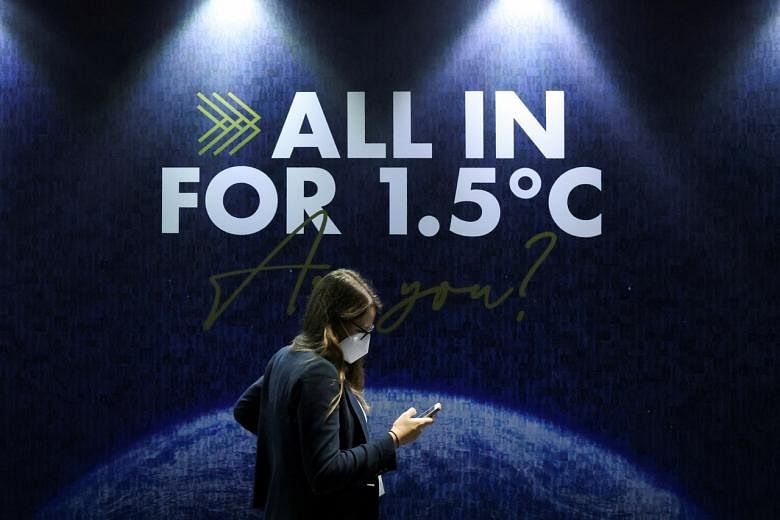GLASGOW - The latest version of the draft decision text for the COP26 climate conference issued on Friday (Nov 12) calls on all nations to strengthen their climate pledges by the end of next year but weakens language around fossil fuels.
The text is the second iteration in the fast-evolving negotiations as the talks enter the final stages. The negotiations are set to wrap up over the weekend and the current draft text is likely to change further.
Experts said the text definitely showed progress but some key issues, especially around finance, remain to be ironed out.
"This is a stronger and more balanced text than we had two days ago," Ms Helen Mountford, vice-president for climate and economics at Washington-based think-tank World Resources Institute (WRI), told a briefing.
Issued by the British hosts of the talks in Glasgow, the text urges countries that have not submitted new or updated climate plans to the United Nations to do so by next year.
Mr David Waskow of WRI said countries agreeing to come back to strengthen their climate commitments is vital. "Setting a timeframe around that is absolutely essential to putting us on a path that will accelerate action."
The text also requests all countries to raise their 2030 climate targets by next year. These targets should be in line with the temperature goals of the 2015 Paris Agreement to limit warming to well below 2 deg C and ideally aim for 1.5 deg C above pre-industrial levels.
In addition, the text asks countries to come back by the end of next year with long-term climate strategies that align with the 1.5 deg C temperature goal. Breaching this level will mean increasingly damaging climate impacts that risk greater loss of life and damage to economies, and "keeping 1.5 deg C alive" is a key theme of COP26.
Ultimately, the talks aim to bolster the commitments under the Paris Agreement and to put the world on a safer path to avoid dangerous climate change. That danger lies in higher global temperatures caused by surging greenhouse gas emissions, particularly carbon dioxide (CO2) but also methane, emitted from burning fossil fuels as well as agriculture and deforestation.
The text weakens references to fossil fuels but the fact they are still mentioned was taken by some as a positive sign, given the expected pushback from big fossil fuel nations such as Australia, Saudi Arabia and Russia.
The document calls on parties to accelerate the phasing out of unabated coal power and end inefficient subsidies for fossil fuels.
It also invites parties "to consider further actions to reduce by 2030 non-carbon dioxide greenhouse gas emissions, including methane".
Unabated coal refers to projects that do not have equipment to capture and store CO2 emissions.
Less clear is the exact meaning of inefficient subsidies. There have been strong calls at the recent Group of 20 summit and at COP26 by poorer, vulnerable nations and conservation groups for the total phasing out of fossil subsidies, which run into the hundreds of billions of dollars annually in the form of electricity subsidies, low-cost loans for oil and gas projects, and tax breaks.
Poorer nations, which disproportionately suffer climate impacts such as stronger storms and rising sea levels, say the subsidies could instead be channelled to green energy projects and funds to help them adapt to climate change.
The issue of finance is a top focus in Glasgow.
A key disappointment for developing nations is the failure of wealthy states to make good on a pledge to channel US$100 billion (S$135 billion) annually to poorer countries by 2020. That pledge now looks to be fulfilled by next year.
The text urges countries to fully deliver on the US$100 billion goal "urgently" through to 2025, when they are then meant to further increase their annual financing to poorer nations. But the text remains unclear on the amount of that longer-term financing and is also unclear on exactly when nations will meet the US$100 billion goal.
"There's still no reference to making up the shortfall, so that's definitely a gap," Ms Mountford said.
Developing nations also want a separate stream of financing to cope with irreparable loss and damage from climate impacts, such as loss of life and total destruction of infrastructure.
In the text is a decision to create a technical assistance facility to provide financial support for technical assistance on loss and damage. But how this will work and how much money will be channelled into it is also unclear.


